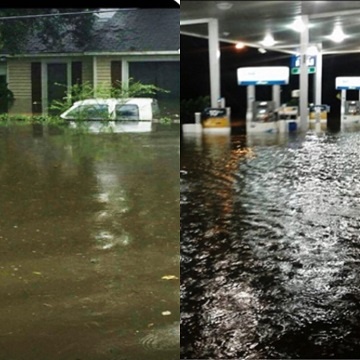Natural disasters are no match for MST-ers
Last week, as Hurricane Matthew devastated Haiti and moved up the southeastern coast of the US, I found it difficult to pull myself away from the news coverage. Families were left displaced, some were separated, most were shell-shocked. I couldn’t help but cross my fingers and hold my breath. I was immediately taken back to my own experience in the recent Louisiana floods.
 Left: The home of MST supervisor, Myisha Johnson. Right: A flooded gas station
Left: The home of MST supervisor, Myisha Johnson. Right: A flooded gas station
Louisianans have experienced a number of devastating events over the last several years, from the movie theater shooting in 2015, to the most well known natural disaster, Hurricane Katrina, in 2005. And just a few short months ago, disastrous flooding resulted in President Obama declaring a state of emergency. Some families lost property to water damage and some lost their homes completely. Numerous highways were flooded and ultimately closed, leaving people stranded across the state, unable to return home, while others were literally trapped on rooftops awaiting rescue. The Multisystemic Therapy (MST) community was not left untouched.
Coming together under difficult circumstances
Perhaps the most compelling part of the recent disaster is the way Louisianans in general, and my MST family in particular have risen to the occasion and supported one another. From the grass roots efforts of The Cajun Navy and the University of Louisiana at Lafayette football players, to MST therapists and supervisors who, despite their own losses, ensured that every young person and family were safe and accounted for, the hard work was inspring.
Just locating families was no easy task. Our therapists and supervisors had to contact extended family members just to get word that young people and their families were safe. A few times, unfortunately, even extensive efforts like this were unsuccessful. MST folks took the “whatever it takes” approach seriously, even scouring social media for activity to ensure safety and to try to make contact.
Putting families first
One clinical supervisor in particular, whose own home was a total loss, continued to show up at work every day to keep her team on track and support them as they served our families and young people facing the very same kind of hardship.
Supervision and consultation were not cancelled. She just kept going and focused on the needs of others. Not only did she leave her own temporary shelter each day to meet the clinical needs of young people and families, she shared her own valuable experience with FEMA and her insurance company as a resource to equip our families with the right information, spending her time after work searching for a more permanent place for her own family.
Despite the devastation, hope remains. Louisianans will do whatever it takes to rebuild and will continue to support one another; whether that means cooking a meal for someone who has a need, making monetary donations or proving household items of their own to neighbors or friends in need. FEMA and the Red Cross will be involved for months to come, but in the end it is the help of a neighbor, a friend, family member or co-worker that seems to have the greatest impact. This is our hope for Haiti and for the people of Florida, Georgia, and the Carolinas: That they bind together, support each other and find peace and hope as they work together for the good of all.
The authors of this blog are MST experts and supervisors from Louisiana.
October is Youth Justice Awareness Month. Awareness is the first step to action, which is what this month is all about. Take action to help another like the MST family did in Louisiana. Click the link below:
Consider attending a YJAM event in your community

